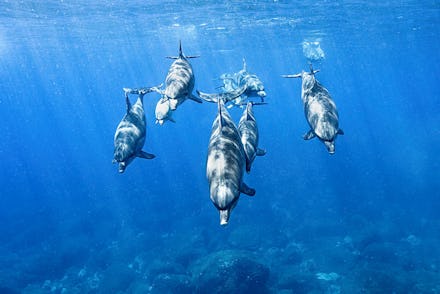Our oceans are in crisis. Here's how you can take action.

World Oceans Day takes place every year on June 8. This year’s theme is Gender and the Ocean, focusing on “ways to promote gender equality in ocean-related activities such as marine scientific research, fisheries, labour at sea, migration by sea and human trafficking, as well as policy-making and management.” What began as an initiative from the Ocean Project has grown to cover a wide variety of key environmental, conservation, and social issues surrounding the health of marine ecosystems. From the United Nations to local communities, events are held all over the globe to celebrate, educate people about, clean up, and conserve the world’s oceans.
If you’re looking to learn more and see where you can help preserve marine environments near you (or virtually!), check out our World Oceans Day guide below.
Donate
There are a wide variety of charities and wildlife organizations that are dedicated to marine conservation. You can chip in to support World Oceans Day itself, but if you’re interested in more specific aspects of activism and conservation, the following organizations focus on a variety of ocean issues.
- Oceana: One of the biggest names in ocean preservation, Oceana has a variety of initiatives including legislative work, promoting sustainable fishing practices, tackling pollution, educational work, and launching wildlife expeditions to document marine ecosystems.
- The Ocean Conservancy: For over 40 years, the Ocean Conservancy has focuses on both the scientific and the policy aspects of environmental preservation with programs in the Arctic, the Gulf of Mexico, and other locations where they focus on wildlife health, removing plastic pollution, and other key issues.
- The World Wildlife Fund: True to its name the WWF is all about protecting the world’s animals. Operating to conserve endangered species all over the planet, the WWF works on a number of marine issues namely restoring endangered coastal ecosystems, reducing plastic pollution, and advocating against overfishing.
- The Sustainable Oceans Alliance: The Sustainable Oceans Alliance is based in Silicon Valley and focuses on helping entrepreneurs launch environmentally-conscious businesses or policy solutions. The organization splits this work into two areas, a leadership development program and its startup accelerator.
Volunteer
If you can’t give money, you can probably afford to donate some of your time. The World Oceans Day website has a complete online register of affiliated events and volunteer opportunities across the globe from plastic cleanups to workshops and film screenings. Even if you don’t live near the ocean, taking the time to learn about ocean preservation and sharing your thoughts with members of your community, or participating online, helps educate others about the importance of preserving the planet’s largest ecosystem.
Run for the Oceans
Now in its third year, Adidas’ Run for the Oceans event is a great way to get your summer workout in while supporting a great cause.
To date, almost 1 million runners have participated in the virtual event, which contributes $1 for every kilometer you run (capped at $1.5m) to educate youth about ocean plastic pollution and sustainability. The program is app-based so you can participate wherever you are, solo or with a group.
Participating is easy and you can even get started from your couch:
- Download the Runtastic app
- Sign up for the RFTO challenge
- Run and spread the word: invite your friends, employees, consumers, to join from June 8-16th, wherever they are.
Note that you can only raise money for the cause if you are a registered participant through the app.
To learn more about Run for the Oceans, click here.
Shop sustainably
One of the best ways to be environmentally conscious and protect marine life is by shopping sustainably and avoiding products whose chemicals or packaging can make its way into the ocean and harm marine life. Some of the most common items found in the water, or washed up on beaches are plastic water bottles, and the chemicals in many sunscreens have been found to contribute to coral bleaching and other environmental damage.
The best solution is to reduce single-use plastics as much as you can and to do your research to find environmentally-friendly alternatives to some of the products you currently use. In addition, there are a variety of brands out there that are donating sales to support World Oceans Day, so keep an eye out whether you’re wandering the aisles or shopping online.
Organize an event
If you don’t see a World Oceans Day event near you, you can create your own! The World Oceans Day website has a catalogue of ideas and support materials to help you organize anything from an art exhibition to nature tours or fundraisers.